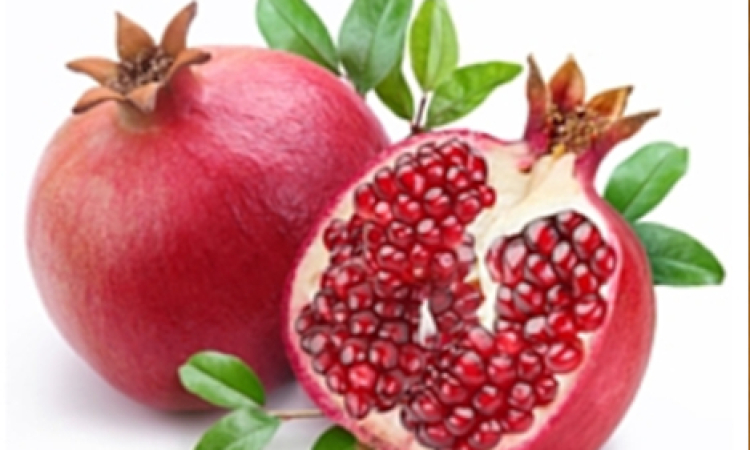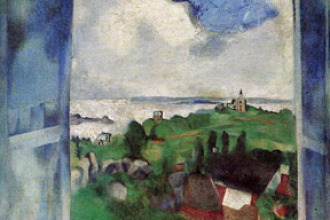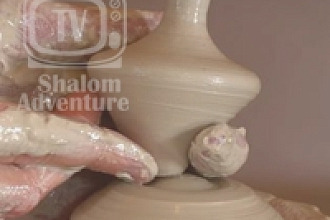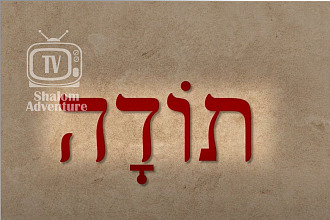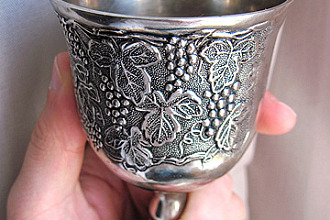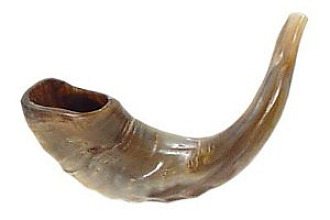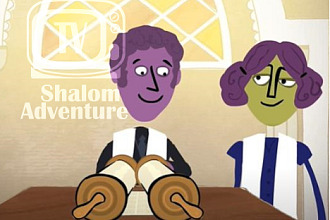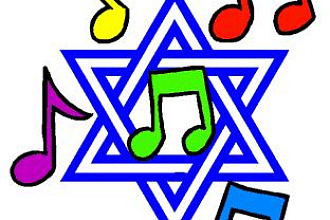You may have noticed that pomegranates are often portrayed in Jewish art in decorations for candle holders, plates, and other kinds of Judaica.
The Jewish priest was supposed to wear a robe “And upon its hem you shall make pomegranates of blue, purple, and scarlet, all around its hem, and bells of gold between them all around: a golden bell and a pomegranate, a golden bell and a pomegranate, upon the hem of the robe all around. And it shall be upon Aaron when he ministers, and its sound will be heard when he goes into the holy place before the Lord and when he comes out, that he may not die.” Exodus 28:33-35
Why Gold? Gold represents the purity of character God accepts. God said, “This third I will put into the fire; I will refine them like silver and test them like gold. They will call on my name and I will answer them; I will say, 'They are my people,' and they will say, 'The LORD is our God.'" Zechariah 13:9. As gold reflects the light of the sun and as Messianic believers we should reflect the light of God’s son in our lives. However the bell was not just gold, the bell made a sound. While we are to reflect the light of God’s truth even without saying a word others should to hear the truth, and we should not be shy to use the sound of our voice to show our connection with God as well as our silent actions to lead to fruitfulness in the Lord’s work.
Yeshua said, “This is to my Father's glory, that you bear much fruit, showing yourselves to be my disciples.” John 15:8 22 and we know “…the fruit of the Spirit is love, joy, peace, longsuffering, kindness, goodness, faithfulness, gentleness, self-control. Against such there is no law.” Galatians 5:22-23. The garments of the priest was important, “But you are a chosen people, a royal priesthood, a holy nation, God's special possession, that you may declare the praises of him who called you out of darkness into his wonderful light.” 1 Peter 2:9 we are to be priests and the priest’s garment had pomegranates and pomegranates are full of seeds. “Remember this: Whoever sows sparingly will also reap sparingly, and whoever sows generously will also reap generously.” 2 Corinthians 9:6
We should not be sparing in regard to sowing the word of God in our lives, not just for our own benefit but that of others as well. But the garments of the priest show us how we should share God’s truth with others-it has both fruit which is sweet and bells to be heard. Some people want to talk about God without having the fruit of a godly character, but this does more harm than good and should not be done at all. As it is said “If I speak with the tongues of men and of angels, but do not have love, I have become a noisy gong or a clanging cymbal. If I have the gift of prophecy, and know all mysteries and all knowledge; and if I have all faith, so as to remove mountains, but do not have love, I am nothing.” 1 Corinthians 13:1-2. On the other hand some people want to have the fruit of a good character but don’t want to talk about God. But the priest has both the bell and the fruit and we must as well. We need God’s wisdom.
So how can you bear fruit? Yeshua said, “I, Yeshua, have sent my angel to give you this testimony for the Messianic communities. I am the Root and Offspring of David, the bright Morning Star.” Revelation 22:16 “Live in me, and I will live in you. A branch cannot produce any fruit by itself. It has to stay attached to the vine. In the same way, you cannot produce fruit unless you live in me.” John 15:4 Bearing fruit isn’t something the branch stresses itself out to do or accomplishes by having all the right doctrines of facts regarding growth, it is something that comes naturally due to its connections with the source of life. The bells on priest’s garment didn’t have to work to make sounds, as the priest walked in God will and went about serving the Lord’s the sound naturally came out. Likewise if our hearts stay connected with God we will naturally produce righteousness that others can see and hear.
Picture originally found here

